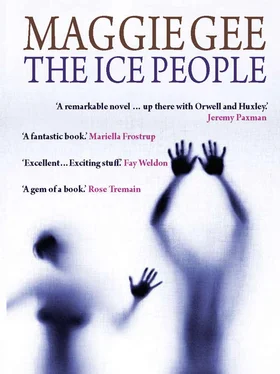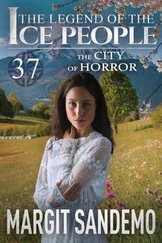Maggie Gee - The Ice People
Здесь есть возможность читать онлайн «Maggie Gee - The Ice People» весь текст электронной книги совершенно бесплатно (целиком полную версию без сокращений). В некоторых случаях можно слушать аудио, скачать через торрент в формате fb2 и присутствует краткое содержание. Год выпуска: 2008, Издательство: Telegram Books, Жанр: Фантастика и фэнтези, на английском языке. Описание произведения, (предисловие) а так же отзывы посетителей доступны на портале библиотеки ЛибКат.
- Название:The Ice People
- Автор:
- Издательство:Telegram Books
- Жанр:
- Год:2008
- ISBN:нет данных
- Рейтинг книги:4 / 5. Голосов: 1
-
Избранное:Добавить в избранное
- Отзывы:
-
Ваша оценка:
- 80
- 1
- 2
- 3
- 4
- 5
The Ice People: краткое содержание, описание и аннотация
Предлагаем к чтению аннотацию, описание, краткое содержание или предисловие (зависит от того, что написал сам автор книги «The Ice People»). Если вы не нашли необходимую информацию о книге — напишите в комментариях, мы постараемся отыскать её.
imagines an ice age enveloping the Northern Hemisphere. It is Africa’s relative warmth that offers a last hope to northerly survivors. As relationships between men and women break down, the novel charts one man’s struggle to save his alienated son and bring him to the south and to salvation.
Maggie Gee
The White Family
The Flood
The Ice People — читать онлайн бесплатно полную книгу (весь текст) целиком
Ниже представлен текст книги, разбитый по страницам. Система сохранения места последней прочитанной страницы, позволяет с удобством читать онлайн бесплатно книгу «The Ice People», без необходимости каждый раз заново искать на чём Вы остановились. Поставьте закладку, и сможете в любой момент перейти на страницу, на которой закончили чтение.
Интервал:
Закладка:
Yet the more I thought about it, driving a hired car through wrecked, icy England, my heart racing, the less sure I was what I had to tell her.
She did agree to meet me, at least. I had put off phoning again and again. I called her, and her voice was older, so much older and harsher than before, but she didn’t sound angry, she sounded sad, even after the first question, harsh, insistent, ‘Have you seen him?’
I said, ‘I’ll tell you later.’
I knew I was old, but I didn’t know how old till Sarah walked past me without recognising me. We’d agreed to meet in the Sainsbury Natgallery, which still opened daily from twelve to three, in Trafalgar Square at midday. The shapes of the lions were softened by snow, and scaffolding still surrounded the column where once some famous hero had stood — Wicca had unseated most male statues. One or two minicopters hovered overhead, but they didn’t seem to be getting much business. Of course it was too cold to meet outside, as we had so often when we were young, sitting in the sun on the wide stone steps. It was a relief to get in from the bitter cold, to pass the armed guards with a deferential nod (see — I’m old — don’t be frightened of me ) and stand at the top of the internal staircase which gave me a good view of the doors.
I recognised her without difficulty because, from above, I saw her hair. It looked, from that distance, shockingly unchanged from the hair she had on the day we first met. It was long again, down past her shoulders, it was that chestnutred I’d loved, it was scattered with snow, with melting snow, and it made me stupid, it made me helpless, for I’d always loved her, always, always.
Her face came into focus as she mounted the stairs. Her determined chin, her delicate nose, her cheeks, which were somehow both puffy and sunken, her mouth, which was twisted with tension and pain — and yet she was still a beautiful woman. Then I noticed her eyes. I saw she was blind. She was gazing ahead of her, seeing nothing. But then, Sarah had always been blind — she swept past me, imperious, or worried she was late, and she wasn’t blind, she just hadn’t seen me, and I spoke, I croaked, ‘It’s me, Sarah …’ And so I was humbled before we began, because I had grown too old to be noticed.
She pulled off her gloves with an awkward little movement and put her hand, which was mysteriously old, as old as I was, into mine. She looked at me. ‘Saul,’ she said. Her voice was harsh, but it was full of sorrow, and I preferred sorrow to contempt, just then.
We sat on one of the glazed leather seats that seemed to have stood in the gallery for centuries, a circular, segmented seat, and we were too shy to sit next to each other, so we left a segment free between us — not free entirely, because freighted with coats, gloves, scarves, all that icy moraine — and looked out at the world, away from each other.
We asked the obligatory questions first. She was ‘very well’, but had bad arthritis, ‘probably the climate, I should move south.’ I suspected from a hint of tannin, a suspicion of fruit, upon her breath, that she drank; which would explain the puffiness. I too was ‘well’, but I really was well, stronger, tougher from all the searching, from living life so much outdoors, from eating simply, sleeping long nights. I looked old because I had been baked in the sun, but when clay is baked it becomes stronger.
‘You know he’s not with me?’ I began.
She knew. She had guessed. ‘I think I know.’ She dragged the big bag she had brought off the seat and began to rifle through papers inside. I could see her hand was hurting her. Wearily she motioned me to sit beside her. The gap between us was bridged too easily.
‘I traced that phonecall you made to Spain. It’s him, isn’t it?’ she said, pushing a sheet of paper into my hand, then another. They were colour images downloaded from the screens, things I had seen in my shabby Spanish office but lacked the facilities to print, distant images of the salvajes, one taller figure rising from the group or standing a little apart in the background, the white undetailed halo of light that might conceal the head of our son, our mysteriously tall and different son. None of them made identification certain, though looking at them with such passionate desire we could both see precise curves of ear and mouth in the vaguest patches of light or darkness.
‘He’s become a myth, hasn’t he?’ she asked me, staring into my face, and I saw a reflection of my own awful hunger in her blue iris, faintly rimmed with white, the ice was coming there as well, the slow stiffening of cataract. ‘The Spanish people are saying he’s like their god, because he’s blonde, because he knows things.’
‘Of course those kids were brought up wild, there must be so much that they don’t know —’
‘And other things they know that he doesn’t. Here, look at these. This one. That’s it.’ She pushed another image into my hand which at first looked exactly like the others. But as I looked closer, I saw what she meant. Instead of one blonde head there were several. The tall blonde youth, a darkhaired woman, and three other white heads so small I hadn’t seen them, three blonde children, playing with a black one.
We looked at each other, and her mouth was crooked, and neither of us could say anything, because this was the point, maybe the point of everything, though we never saw what we were moving towards …
Probably it didn’t matter what we aimed for. Blindly following the arrow of light.
Then it was time to tell my story.
It happened in the year when Luke would have been twenty. The little village of Buena Ventura was quiet that night. I had arrived after a long day selling tickets too late to wake the woman at the pensión, and since it was August, and a warm dry evening, I decided to sleep in the square in my car. This village had been overrun, the week before, by a daylight visit from fifty or so of the wild children, descending like locusts on the shops and the houses, grabbing all the food they could carry and running off with three goats and six horses, one of them ridden away up the track by a tall blonde boy, handsome, laughing. (‘The bastard was laughing,’ the mayor raved on the phone. He thought I was an investigator. Indeed, I was an investigator, but he didn’t know how we were connected, or what a shock of happiness that detail gave me.)
Perhaps I haven’t made it clear enough that the salvajes were a band of thieves. They called them mestizos, too, ‘mongrels’, because these kids were such a mixture, Arabs, Africans, Andalucians. If Luke were a leader among the wild children, to most people he was just a criminal. One of my fears, as I hunted Luke through Spain, was that an irate farmer would shoot him dead.
I knew they probably would not come back, because they hardly ever did. They were nomads, really, they always moved on. But it didn’t lessen my need to follow, my need to be where Luke had been. To imagine him happy — that was best of all. I had a few drinks from a bottle of wine I’d picked up along the way and drifted off, thinking of Luke in the saddle, laughing, imagining him in the dusty square … I fell asleep feeling happy, for once.
I woke up uncomfortable, and needing to piss. It’s a sign of age; you need to piss.
(Sarah interrupted; ‘Women too.’ So that was an advance; women weren’t perfect.)
I heard a dog or a cat outside, rooting about in some rubbish nearby, as I opened the door to take a leak, and looked across the square, which was flooded with moonlight, in the direction of the little whitewashed church of the Sagrada Vista, twenty metres away.
He was there, in the moonlight, astride his horse, holding it steady, watching me. His face was black and white in the radiance. His expression was unreadable, shadowed by his curls. He was taller, larger than I had expected. I tried to speak; I tried to run. As soon as I began to move towards him he pulled the reins, wheeling away, and I managed a brief, strangled ‘Luke’ before I remembered I mustn’t wake the village.
Читать дальшеИнтервал:
Закладка:
Похожие книги на «The Ice People»
Представляем Вашему вниманию похожие книги на «The Ice People» списком для выбора. Мы отобрали схожую по названию и смыслу литературу в надежде предоставить читателям больше вариантов отыскать новые, интересные, ещё непрочитанные произведения.
Обсуждение, отзывы о книге «The Ice People» и просто собственные мнения читателей. Оставьте ваши комментарии, напишите, что Вы думаете о произведении, его смысле или главных героях. Укажите что конкретно понравилось, а что нет, и почему Вы так считаете.












